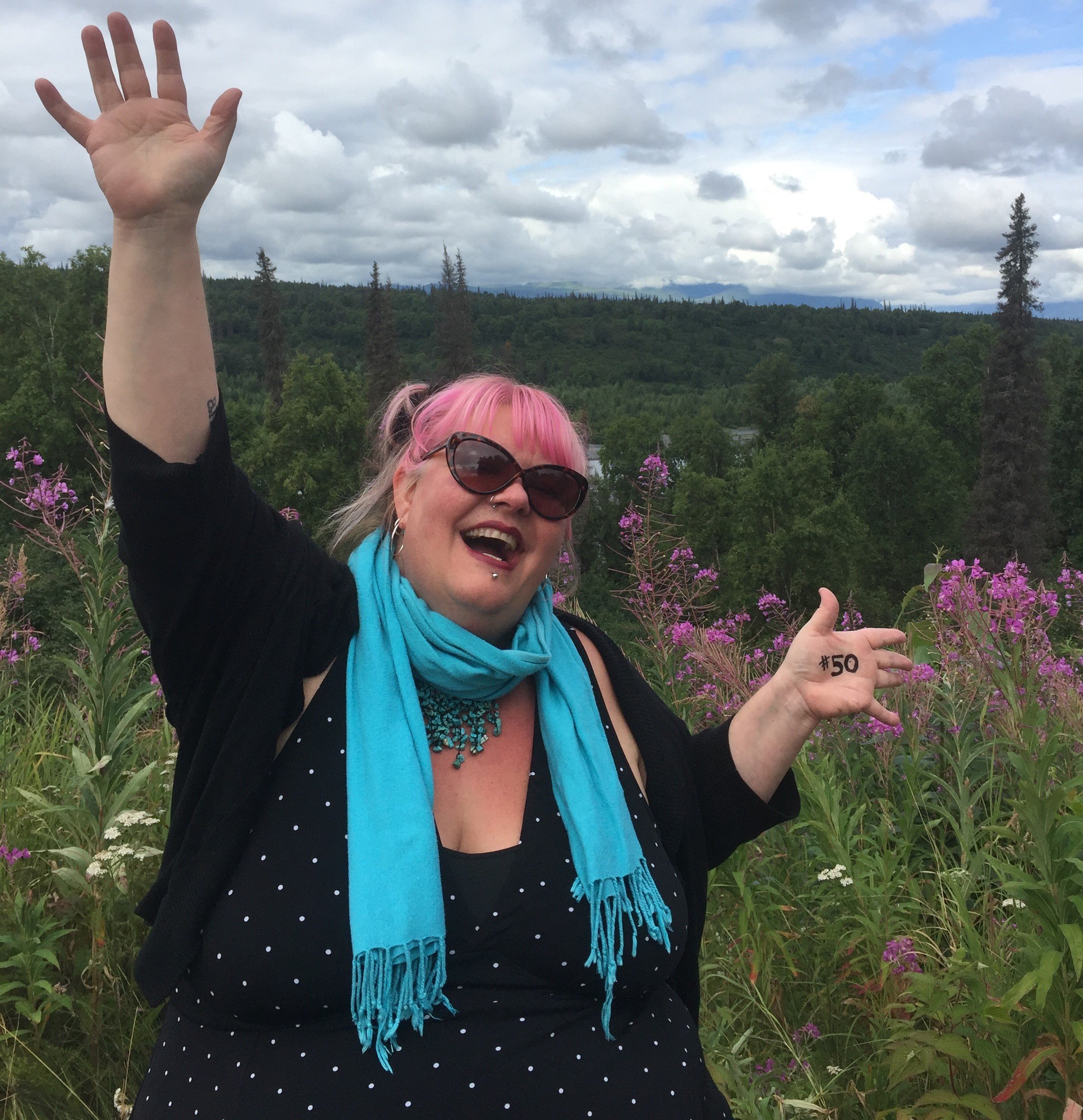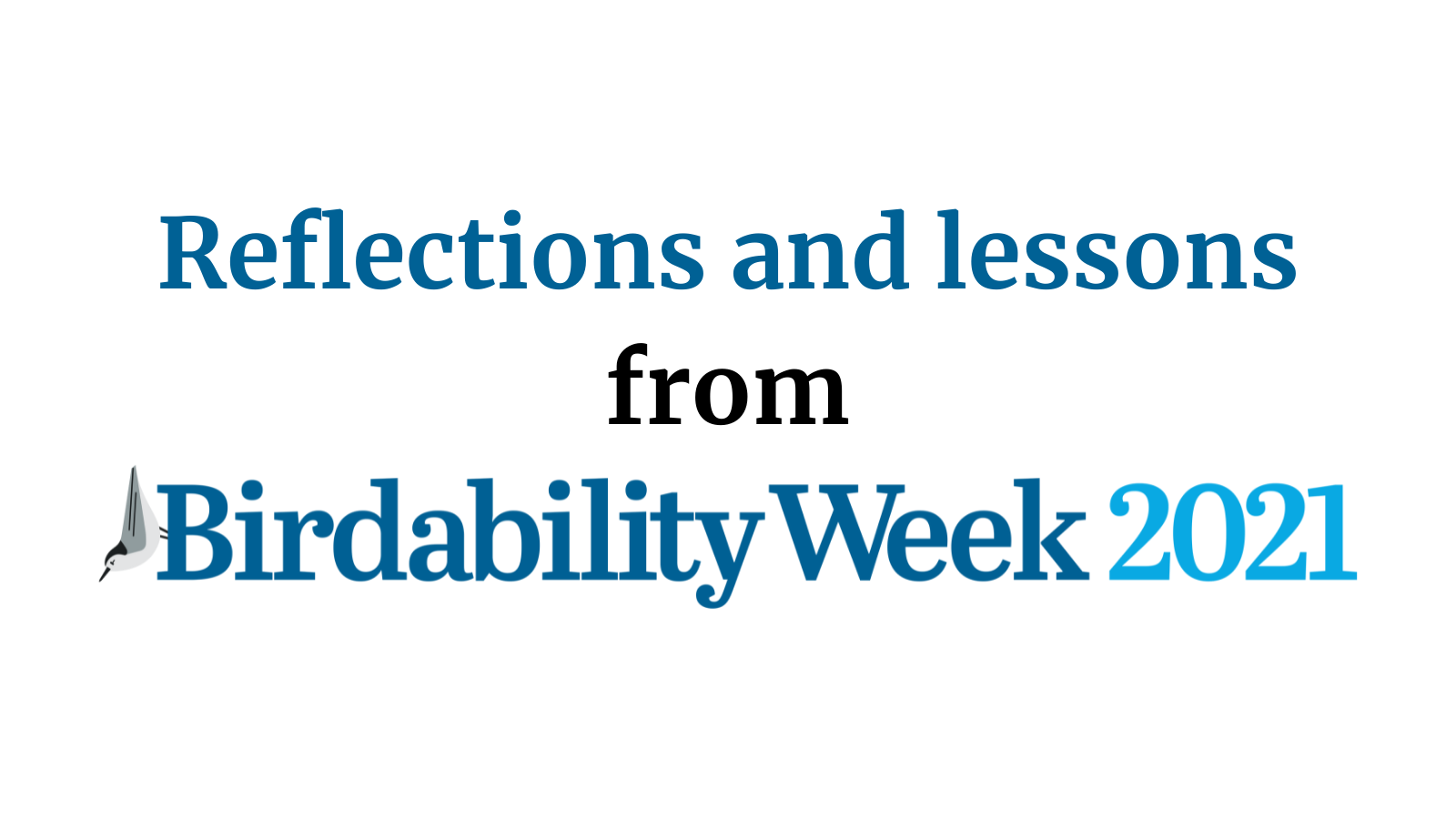Migration: Eyes on the Sky
World Migratory Bird Day, October 12, 2024, is a fitting time to delve into the next chapter of Gary Herritz's Migration series. Gary's birding journey isn't just about the incredible species he encounters; it’s a story of adaptation and resilience and birding while disabled. When his apartment complex adopted a "3x rent" income policy, making housing unaffordable on SSDI, Gary made a bold choice—he hit the road, stepping well outside his comfort zone and turning his vehicle into a mobile home for birding adventures. His latest stop? Tubac, Arizona, where the skies come alive with raptors at the HawkWatch International site.
Birding for the Mind
Birding for the Mind
"With constant reminders about all the turmoil going on in the world and the fact that my body often betrays me, I find that birding refocuses my mind and takes me to another place—a better place," writes Ann Marie Geiger. In those moments, anxiety and physical pain dissipate, like storm clouds breaking up after a downpour. It’s a subtle but profound shift—tense muscles begin to loosen, and suddenly, she’s breathing again, even though she hadn’t realized she’d been holding her breath.
Meet Birdability Captain Kalina Eskew: Championing Disability Justice in Birding
We are thrilled to introduce Kalina Eskew (they/them), one of Birdability's dedicated Captains, who is making significant strides in promoting disability justice within the birding community. Kalina is currently pursuing their Ph.D. at Texas A&M University in the Department of Ecology and Conservation Biology and their research focuses on bird behavior and how birds respond to anthropogenic sensory pollution, such as light and noise from vehicles.
Kalina's journey into birding and disability advocacy is deeply intertwined.
Birdability Captain Spotlight: Diane Allison- Pioneering Accessible Birding with PCAS
Diane Allison, a dedicated Birdability Captain in Pennsylvania, has transformed birding into an inclusive activity for all. Inspired by her friend's experience with multiple sclerosis, Diane adapted birding methods to include car birding and accessible vans, among other methods, ensuring everyone can enjoy the experience. Partnering with the Pennsylvania Center for Adaptive Sports, Diane leads adaptive birding outings and innovative events, making a profound impact on her community and promoting the joy of birding for people with disabilities.
Celebrating the 2024 Birdability Interns
We are so excited about the Birdability Internship Program, a groundbreaking initiative aimed at enhancing the accessibility and inclusivity of national parks for birding enthusiasts of all abilities. Birdability, in collaboration with Environment for the Americas, has created this internship with the National Park Service to foster a more inclusive and accessible environment in our natural spaces.
Migration
In celebration of the final day of National Fair Housing Month, celebrated every April, we're sharing the story of a Birdability Captain and community member, who was forced to navigate the challenges of restrictive housing policies while living with disabilities. Facing the daunting "Income must be greater than 3x rent" rule, Gary Herritz embarked on a remarkable adventure, choosing to embrace nature and birding as home instead.
The scarcity of affordable housing across the nation has cast a wide net of hardship, yet its impacts are far from uniform. Those with disabilities face a uniquely daunting challenge in securing housing. Shelterforce shares that “renters with disabilities are often unable to meet the kinds of admission criteria that landlords establish for their properties”, forcing them to make difficult decisions and sometimes leaving them with few housing options. For Birdability Captain, Gary Herritz, it meant choosing a different form of migration.
March Captain Spotlight : Cassandra Dean
Spotlight on Cassandra Dean: Empowering Birding for All Abilities
In the world of birding, accessibility isn't always a given. Cassandra Dean experienced that firsthand and it compelled her to take action. Thanks to passionate individuals like Cassandra Dean, the landscape of inclusive and accessible birding is changing. As a Birdability Captain, Cassandra is on a mission to ensure that everyone, regardless of ability, can enjoy the wonders of birding and nature.
Introducing Birdability’s Executive Director
Cat Fribley joined us as Birdability’s Executive Director last fall and we asked her to tell us about herself!
Introduction to Birding: When my college roommate pointed out a bird on a tree as we walked to class on an autumn day in 1990, I didn't anticipate that this moment would mark the beginning of something wonderful. While I can't pinpoint whether my spark bird was a red-bellied woodpecker or a yellow-shafted flicker, I can unequivocally say that it was a woodpecker, and it ignited a lifelong love of birds.
How My Husband’s Disability Eased my Anxiety and Enhanced my Birding
Last year, my husband Kyle suffered a massive stroke. In an instant, our lives changed. He became permanently disabled and would need rigorous speech, occupational, and physical therapy, which he continues to this day.
One year later, his hard work at rehabilitation has allowed us to live independently and get back to our lives and marriage – albeit things look a lot different than before.
Kyle isn’t a birder – it is my sole endeavor – but one day he surprised me and said, “I’d like to go birding with you this weekend.” He must have known I was aching to get out!
Accessible Christmas Bird Counts
Christmas Bird Counts (CBCs) are an annual community science project, going on 123 years, in which teams of birders collect data on winter birds. The National Audubon Society organizes this event as an effort to track bird population trends and the data is valuable to biologists and conservation!
Over the past few years, Birdability has encouraged birders to organize CBCs that are accessible to disabled birders. Historically, birders who experience access challenges were often unable to participate in the Christmas Bird Count, but we are working to create opportunities for these folks to be included in their local CBCs.
Competing in the World Series of Birding with Autism and chronic illness
When I was invited to be a part of Birdability’s Team Nuthatch at the World Series of Birding, so much of this seemed impossible. How was I going to drive one of the most difficult routes in the country, from Connecticut, around the sprawl of New York City, to southern New Jersey? How could I spend a weekend with a team made up of five people I’d never met in person? How would I deal with the uncertainty of birding at a new place during a large event I was unfamiliar with?
But I said yes, anyway.
Accessible interpretive signs we love!
Interpretive signs can be wonderful ways to learn about and engage with a birding location you’re visiting… if you can access them. Here are some examples of interpretive signs we love (because they’re accessible!) and ones that could use some improvement.
Trading in my wings for wings: Complex Regional Pain Syndrome and bird photography
At eight years old I took my first flight lesson. I knew flying was what I was going to do the rest of my life. I was mystified beyond belief. How was I just suspended in the air? My fascination with birds had begun, but I had not realized that. Looking down from the window of the plane, over Atlanta, I could see my whole life: where I lived, where I was born. Places that I had seen so many times, but never from this perspective.
A success! Birdability and allyship in action at the San Diego Bird Festival
Last week, Birdability founder Virginia Rose and Birdability Coordinator Freya McGregor were birding in Southern California. Here’s a wrap up of why the San Diego Bird Festival, held by San Diego Audubon Society, was a success from Birdability’s perspective. It boils down to the fact that San Diego Audubon, and the festival coordinator Jen Hajj in particular, are wonderful allies.
Birds connect me to the world: Ways you can enable Autistic birders
Day-to-day life as an autistic person can be unpredictable. I often feel unbalanced. Birds connect me to the world. Yet, when I’m birding, everything holding me down feels less weighty, like being buoyant in salt water. The connection provides relief from isolation, and the weightlessness quiets anxiety and uncertainty. I’m both grounded and untethered in a fleeting moment of bird-human-nature encounter.
Why is a White-breasted Nuthatch Birdability’s logo?
There has been speculation on social media, via email, and in presentations. So, to celebrate one year of Birdability becoming a non-profit, it’s time to get to the bottom of this burning question. Why is a White-breasted Nuthatch Birdability’s logo?
Birding and creating comics while colorblind
My love of bird watching has always been paired with my desire to illustrate them. But behind my love of birds was always the pestering problem of my color blindness. As a whole, "color blindness" is a pretty vague term to a not uncommon condition. Worldwide about 7% of men and .05% of women have some form of colorblindness. Simply put it's "it's the inability to distinguish certain colors."
Quick facts about braille
Braille is super cool. A tactile code (not a language of it’s own), it is used to write languages from English to Arabic so people who are blind or have low vision can read. We love seeing braille used labelling diagrams on interpretive signs; labelling trail maps; an in booklets visitors to natures centers and parks can borrow, so braille readers can access the same information on interpretive signs that sighted visitors can.
How birds inspired me to advocate for my hearing loss
Birding has been central to my sanity. Whenever I felt overwhelmed or frustrated, I made the time to go birding. Unfortunately, even this relaxing activity is not immune to my struggles with hearing loss. When I am birding in a group I am met with phrases like, "Get your ears checked." Or, "Are you stupid? Why can't you understand me?" when I ask someone to repeat themselves. I find these events to be more frustrating than they are worth, so I rarely interact with other birders.
Reflections and lessons from Birdability Week 2021
Wow! What a blast. Birdability Week 2021 was even more exciting and empowering than our first Birdability Week last year. From amplifying the experiences of birders with access challenges, to helping more folks feel like part of the birding community; from sharing about the features of a truly accessible trail, to learning important lessons on respectful collaboration. We even continued to redefine birding! There were a lot of wonderful learning opportunities, too, some recorded here in case they’re of value to you, too.



















